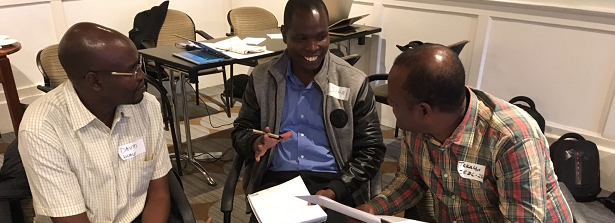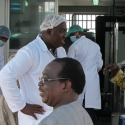Nairobi Workshop on intermediaries in food security partnerships

May 10-11, 2018 the coordinators of the Global Challenges Prpogramme project “Intermediaries in inclusive business networks for scaling food security in East & West Africa” organized a two day workshop “Research insights on the role of intermediary in cross border partnership to stimulate scalable food security solutions” in Kenya. The project group (WUR, Scorepoint, ICRA) invited Kenyan and representatives of international intermediary organizations working on inclusive business strategies within food systems, such as INGOs, impact investors, technical advisors of research institutes and policy officers of the German and Dutch Embassy (GIZ, TechnoServe, IFDC, Hivos etc.). In total 25 people attended the workshop. A third of the participants were staff related to partner organizations involved in the 2SCALE program, as the research project builds on this programme.
The 2SCALE program aims to improve the food security of at least 1 million smallholders in East and West Africa by strengthening approximately 500 Agri Business Clusters. These are innovative collaborations between local farmers, entrepreneurs and other stakeholders of the food value chain, to improve the access to local and regional African food markets. This GCP research is aimed to produce new knowledge on the role of intermediary organisations facilitating impactful inclusive business in programs such as 2SCALE.
The workshop was built up in 4 modules. The first morning we focused on the role of intermediary organizations in public private partnerships on food security Research findings on the characteristics of 56 international intermediaries were shared and discussed.
In the afternoon the project group presented the 5 dominant intervention strategies used by companies (and their partners in the value chain)to develop inclusive business for improved food security in low income markets. Participants were invited to do some exercises to get a better understanding on the characteristics of each of these business models, and to reflect which business models they are currently developing themselves. This enabled them to reflect on the business models they have tried to develop, in which dominant strategy it fits and which key characteristics they could take into account to improve their performance.
The second day the research trainers presented the assessment tool for inclusive innovation context analysis. The GCP-project tested this tool on 11 Sub Saharan countries, and shared the findings. After this, the participants were invited to practice with the tool. The participants became aware of the opportunities and limitations certain innovation context have for introducing an inclusive innovation. They confirmed the need for such a tool to analyze this context prior to the start of the inclusive innovation development, as this helps to define risk mitigation strategies and engage other stakeholders to help overcome eventual barriers that are caused by the national innovation system that may jeopardize the success of the inclusive innovation.
The last afternoon of the workshop a world cafe session was organized in which participants analyzed the influence of cultural differences on the development of public private partnership for inclusive business.
The PowerPoint with the presentations and exercises of the workshop can be found here.
During the days explanation of research methodology and findings, was combined with practical exercises. This enabled the participants to improve their performance in cross border partnerships for inclusive innovation. Furthermore the workshop was a try out for testing practical participants reception of the material, which appeared to be very positive also from the Dutch embassy side. So with feedback from the participants, the project will evolve the workshop material into a training that will be used later this year in Nigeria and Kenya. ICRA and the participants of the workshop can use the workshop material for their own training and project development activities.






